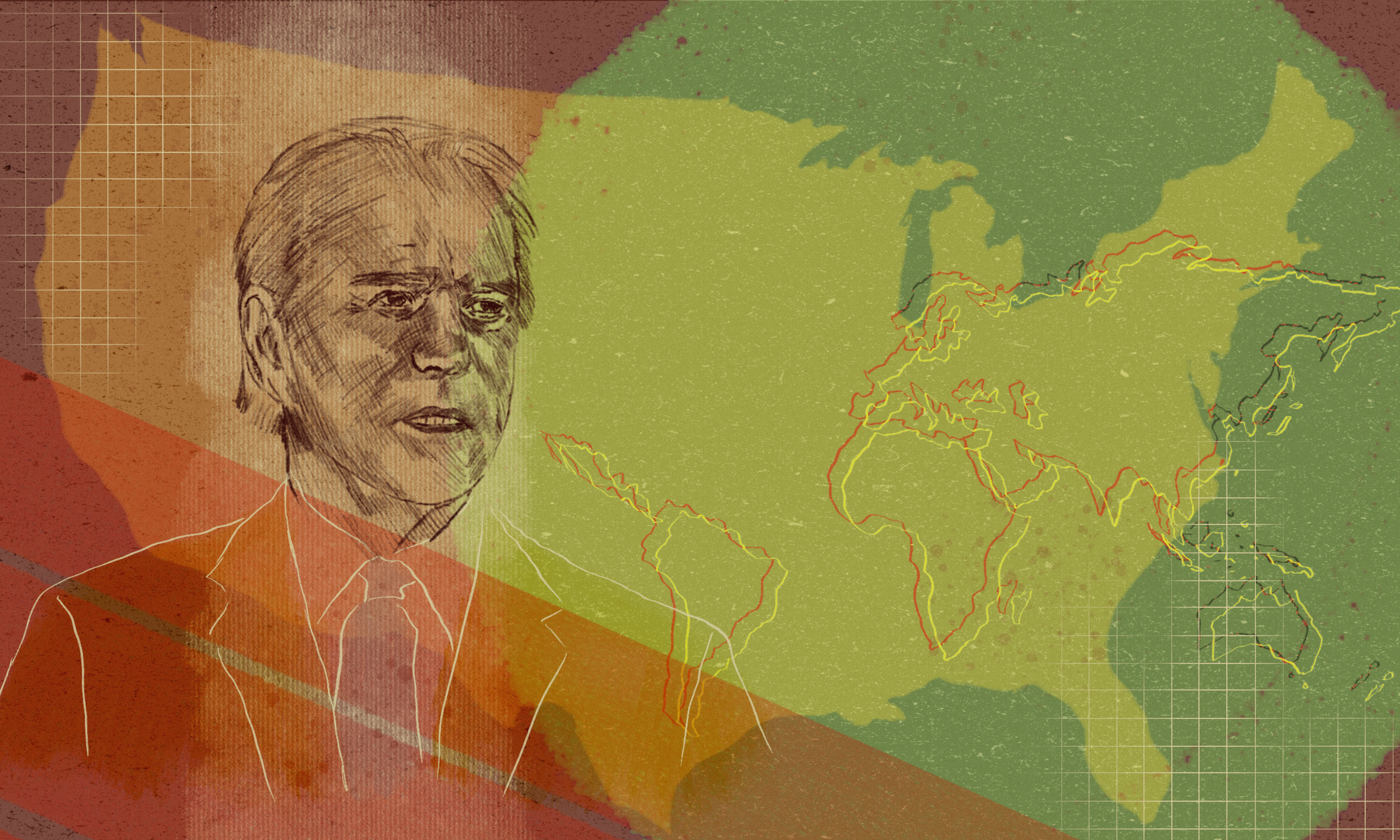I’ve found it difficult to study international affairs while America is ripping at the seams.
Reading foreign policy think pieces and watching diplomacy webinars seem to inevitably end with my mind drifting to headlines that hit much closer to home. Like so many young people, the Trump years have left me more politically active, as I’ve come to understand the importance of my dissenting voice in a Zoom town hall and the power of my physical body in a street demonstration.
I’ve tried to strike a balance between studying global relations and finding my place in local advocacy. But the Jan. 6 attack on American democracy stirred something inside me that I’ve kept at bay for a while now: doubt in my career path. As a Thomas R. Pickering Foreign Affairs Fellow, I’ve committed to joining the U.S. Foreign Service after graduation. Becoming an American diplomat is something I’ve dreamed about and worked toward for years. Yet, with so much critical work to be done at home, I find myself wondering if moving thousands of miles away is the right choice.
Forced to reconcile the reality of America with my duty to represent it abroad, I’ve come to a realization: American foreign policy is profoundly connected to racial and social justice at home and around the world. Pivoting toward a progressive approach to foreign policy is a necessary—yet often unacknowledged—step toward justice at home. As we begin to dismantle societal and structural racism domestically, we must realize American racism, imperialism, and militarism are mutually reinforcing.
Rather than compartmentalizing foreign and domestic affairs, American foreign policymaking needs to adopt the same theory of change and progressive ideology as American racial justice activism. Stateside, BIPOC activists and allies have identified what we need: honest, painful acknowledgement of racial injustice and systemic racism, followed by structural change and reparations. Future diplomats and foreign policymakers have the same work cut out for them. These potential change-makers must confront the American exceptionalism that has long allowed white supremacy to seep into our policy. They must then imagine what progressive, anti-racist foreign policy could look like and reform American foreign policy accordingly.
-
Recognize how American exceptionalism has allowed white supremacy to taint U.S. foreign policy
There is a long history of white supremacy animating U.S. foreign policy. The United States was built on the backs of enslaved Black people and consolidated through Manifest Destiny-esque policies that denied Indigenous peoples the right to own and cultivate their own land. This legacy has permeated America’s interventions abroad, from Theodore Roosevelt’s expansionist policies to Cold War-era coups across the “Third World.” White supremacy continues to drive the xenophobic rhetoric that undergirds the global War on Terror and conflates violent extremism with Islam. Rooted in a disdain for Black and brown foreigners, the “America First” mindset has led to policies like the Muslim ban, the border wall, and family separation.
Many disastrous U.S. interventions abroad have been predicated on a belief that America knows what’s best for other nations—a sentiment that rests on a sense of white American supremacy. A quick look at recent interventions (i.e. Ukraine, Libya, Afghanistan, Bosnia and Herzegovina, Iraq) illustrates a clear distinction between the way the United States intervenes in the domestic politics of European and primarily non-white nations. In the name of national security, the United States has created a tough-to-dismantle paradigm in which American supremacy discerns which nations deserve the benefit of the doubt, which can be dealt with diplomatically, and which will be subject to the American military machine. More often than not, wars are waged on predominantly Black and brown countries.
As a student of the Arab world, I am acutely aware of the various ways American exceptionalism has devastated the Middle East and North Africa (MENA). Imposing sanctions, toppling heads of state, and designating “terrorist” organizations have been cornerstones of foreign policy in MENA. One need only look to America’s footprint in Iraq to see the deadly consequences of these tactics. Consecutive American administrations imposed sanctions throughout the 1990s, which aimed to punish Saddam Hussein’s regime but actually hurt Iraqi civilians and disproportionately harmed Iraqi women. In 2003, prioritizing elite corporate interests, the Bush administration decided to invade, violating Iraqi self-determination. Iraq has suffered from economic deterioration, corrupt governance, and violent militancy in large part due to the instability created by the American occupation.
Another one of America’s dangerous foreign policy legacies is the concocted stories we tell ourselves about our country’s imperial tendencies. The United States intervenes around the world in the name of “crisis prevention,” “poverty reduction,” and “democracy promotion.” It’s time to drop this pretense and recognize that American involvements around the world are often chiefly concerned with regime change, resource extraction, and maintaining hegemony. These misguided interventions have long been grounded in a notion of white American supremacy. At home, activists have identified the crucial first step toward racial justice: collective acknowledgement of racism and oppression, past and present. Similarly, American foreign policy can no longer get lost in abstract, idealist intentions. Moving forward, American decision makers have to foreground the United States’s tangible effect on global communities. In the SFS, specifically, we need to challenge revisionist histories that present the U.S. government as infallible and cloud our ability to correct bad policy.
2. Theorize what progressive, anti-racist U.S. foreign policy should look like
With a new administration in the White House, there is a lot of talk about recovering America’s credibility abroad, much of which was lost with Donald Trump at the helm. We cannot, however, let the conversation end at how to merely “save” our image abroad. Long before 2016, America’s legitimacy was predicated on domination and inequity. Ousting Trump, rejoining multinational organizations, and repairing alliances are only the first steps in a long process of reinvention. It is up to emerging foreign affairs professionals to build out a new, progressive foreign policy that mimics the principles adopted by activists in the fight against racial injustice at home: democratization and demilitarization.
For too long, our approach has been tainted by white supremacy, neocolonialism, economic exploitation, patriarchy, and xenophobia. Instead of making decisions with elite interests in mind, we need to democratize American foreign policymaking to center the people who are most affected by American decisions. By prioritizing the voices and needs of the populations our policies disproportionately affect—women, LGBTQ+ people, people of color, people in the Global South, Indigenous people, and low-income communities around the world—we will develop policies that uplift everyone. To do this, we need to look to new thought leaders and emerging think tanks, opening up the conversation to diverse institutions with fresh ideas but historically less clout.
Examples include Win Without War and Security in Context, which challenge long-established norms and apply a critical lens to foreign policy. Students of international relations can also use their remaining coursework to start crafting the theses, scholarly articles, and policy memos that will become the foundation of progressive foreign policy thought.
We must also demilitarize our foreign policy approach. The United States continues to apply the use of military force to a variety of security challenges that do not have military solutions—with ruinous results. Twenty years of U.S. troops in Afghanistan and billions of U.S. taxpayer dollars spent to fight the Islamic State clarify two things: Most security challenges do not have a military solution, and not every security challenge presents an existential threat to the United States. Rather than rely on policies that fight fire with fire, the United States must adjust its national security framework to be based on conflict prevention, locally-led development, and peacebuilding.
3. Confront the status quo and champion reform throughout our careers
Of course, there are many reasons U.S. foreign policy hasn’t kept up with the growing progressive movement at home—power, money, inertia, to name a few. Altering this course will not come easily. We SFS students will have to break with the status quo. For future activist scholars, that means questioning the United States’s go-to foreign policy tools, like regime change, comprehensive sanctions, arms sales, and terrorist designations. For future civil and foreign service officers, that means embracing constructive dissent as a part of the policymaking process. For students of foreign affairs, that means engaging with “taboo” topics like Palestinian human rights and criticism of the U.S. military.
I let out a sigh of relief on President Joe Biden’s inauguration day. As I head toward graduation and the beginning of my career, I would be lying if I said a weight wasn’t lifted off my shoulders when Trump landed in Mar-a-Lago, retired and impeached. But as so many activists have made clear, the work is far from over. And I can only imagine other SFS students also feel torn between their interests in international affairs and their commitments to their home communities. This moment gives us space, as students and as future foreign policy professionals, to reorient ourselves and to realize that it is entirely possible to align our global interests with our local commitments. If we want to use our coming careers to move the needle toward justice, at home and abroad, we need to head in a completely different direction: toward a progressive foreign policy.





